Swiss reluctant to confront glacier-less Alps
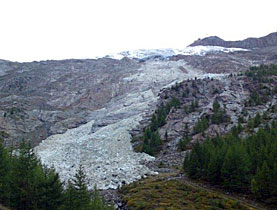
Swiss alpine communities are aware of the importance of glaciers for tourism, water and energy, but are ill-prepared for a glacier-less future, a report has found.
The study by the Swiss foundation for the protection of the countryside was presented at a two-day conference on the impact of melting glaciers on Swiss mountain regions, held at Crans-Montana in canton Valais.
According to the survey, around 90 per cent of communities living near glaciers benefit from them via tourism, or meltwater used for hydropower or drinking water.
But only 13 per cent of the 131 communes questioned said they had drawn up future action plans as glaciers retreat.
“Extending over 1,000 square kilometres, Swiss glaciers have a huge influence on the environment, habitat and local population and it’s hard to imagine they might one day disappear,” said study author Christine Neff.
“But communities are very laidback and are just waiting for things to happen.”
They need to come together to share best practices for dealing with melting glaciers, and residents, tourists, local authorities and schools should be better informed about the impact, Neff told the 70 participants.
She highlighted new initiatives like the Jungfrau Climate CO2 operation programme and its iPhone climate guide, put together in collaboration with climate change experts from Bern University.
Bruno Abegg, a geography professor at Zurich University, joked that villagers could always pray for glaciers to stop retreating, like residents from Fiesch, in canton Valais.
“But ultimately they had to envisage other solutions and perhaps become energy-saving pioneers or even energy self-sufficient,” he said.
Alpine Convention
Glaciers are melting fast and we feel powerless, said Stefan Kunz, president of the Swiss branch of the International Commission for the Protection of the Alps.
“But I’m convinced that we will do something, keeping things local and strengthening local economies, and there will be a focus on the quality tourism rather than quantity,” he said.
At the political level it is important that Switzerland develops a more coherent Alps policy, said Kunz.
“Switzerland will be president of the Alpine Convention from 2011-2012 and it should use this to make a difference and ratify outstanding protocols which still haven’t been ratified,” he added.
Frightening figures
Swiss glaciers are retreating at an accelerating rate and the large majority could vanish this century, say glaciologists.
According to research by Zurich’s Federal Institute of Technology some ten cubic kilometres of ice was lost from 1,500 glaciers over a nine-year period from 1999-2008 – or 13 per cent.
A separate study by the institute’s scientists analysing mass trends of 30 glaciers of different sizes, types and locations between 1900 to 2007 showed an accelerating negative trend.
Since 2000 the average loss rate recorded over the two previous decades has doubled, and the 1998 annual record for melting glacier ice has been beaten three times.
“These are very impressive, frightening figures,” said Wilfried Haeberli from Zurich University.
“As a realistic future scenario, if man behaves reasonably three-quarters of the glaciers will disappear this century. The best we can do is to save half of the volume of the glaciers.”
Hazards
Haeberli underscored the hazards for villagers living in the shadow of disintegrating glaciers, such as rock and icefalls and new glacier lakes.
“Where and when will the lakes form? What hazards can occur? Who owns the new lakes and what conflicts could develop?” Haeberli asked the audience.
Charly Wuilloud, head of the natural dangers service in canton Valais, said of the 51 potentially hazardous glaciers in the region identified in 2000, 29 could be dangerous over the next ten to 20 years.
But avalanches, rock falls and flooding were his main concerns, while glaciers only amounted to two per cent of current risks, he said.
And he tried to give reassurances and put the recent collapse of 200,000 cubic metres of ice from the Fee Glacier above Saas Fee in context, describing it as “nothing threatening”.
Simon Bradley in Crans-Montana, swissinfo.ch
Glaciers are large masses of snow, ice and rock debris that accumulate in great quantities and begin to flow outwards and downwards under the pressure of their own weight.
They are formed when yearly snowfall in a region far exceeds the amount of snow and ice that melts in a given summer.
In Switzerland, glaciers play an important role as water reservoirs for hydro-power production (generating 50% of the country’s electricity). They are also considered an important tourist attraction.
Glaciers around the globe have been shrinking significantly since the second half of the 19th century, according to the Swiss-based World Glacier Monitoring Service.
It said there were strong glacier retreats in the 1940s, stable or growing conditions around the 1970s, and again increasing rates of ice loss since the mid 1980s.
Under current climate scenarios presented by the Intergovernmental Panel on Climate Change (IPCC), the ongoing trend of worldwide and rapid, if not accelerating, glacier shrinkage may lead to the deglaciation of large parts of many mountain ranges by the end of the 21st century.
Switzerland’s glaciers lost 18% of their surface between 1985 and 2000. In the Alps, the average loss has been 22%. Swiss glaciers are melting more slowly because most are at high altitude.
Meltdown first affects smaller glaciers – which represent 18% of total glacier surface but nearly half the losses incurred – according to a 2004 study from Zurich University.

In compliance with the JTI standards
More: SWI swissinfo.ch certified by the Journalism Trust Initiative

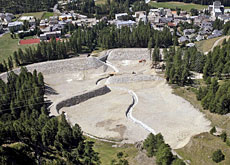
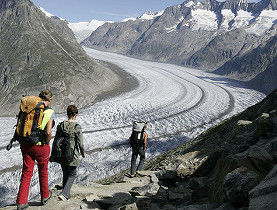
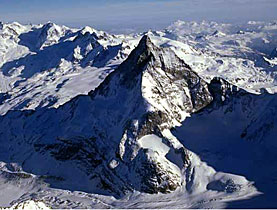
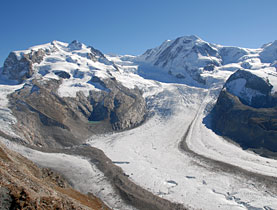
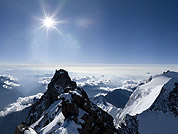
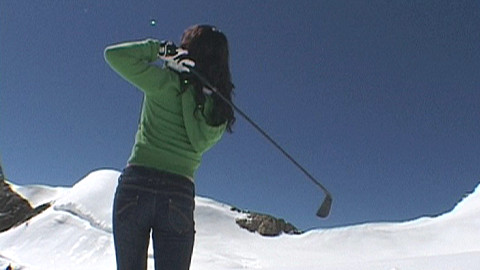
You can find an overview of ongoing debates with our journalists here. Please join us!
If you want to start a conversation about a topic raised in this article or want to report factual errors, email us at english@swissinfo.ch.